|
|
|
Sort Order |
|
|
|
Items / Page
|
|
|
|
|
|
|
| Srl | Item |
| 1 |
ID:
095286
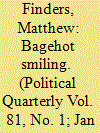

|
|
|
|
|
| Publication |
2010.
|
| Summary/Abstract |
The MPs expenses scandal that erupted in May 2009 has certainly rekindled interest in the next stage of constitutional reform and democratic renewal in Britain. This article examines how Gordon Brown's tenure as Prime Minister has differed from Tony Blair's in relation to the 'new politics' narrative. It argues that despite his long-term personal commitment to major constitutional reforms, the role of crises in recalibrating the political opportunity structure and the manner in which electoral incentives can alter elite attitudes to institutional change that Brown's tenure can be characterised by optimism followed by timidity. Gordon Brown may have flown a few kites in relation to a written constitution, electoral reform, English devolution and the future of the House of Lords but he has left things far too late for a 'constitutional moment'. Brown may have the political inclination but he lacks the capacity to deliver far-reaching reform; Cameron is likely to have the capacity but not the inclination.
|
|
|
|
|
|
|
|
|
|
|
|
|
|
|
|
| 2 |
ID:
106533
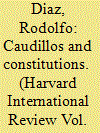

|
|
|
| 3 |
ID:
156093
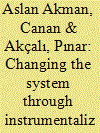

|
|
|
|
|
| Summary/Abstract |
Since the 1990s, debates on a constitutional system reform in Turkey have ignited controversies over the executive structure of its parliamentary system. This article looks at the debate in terms of the interaction between institutional dynamics and politicians’ choices, shaped by past institutional transformations following transitions. It is contended that institutional weaknesses underlying both the presidency and executive–legislative relations in Turkey have provided strong incentives for incumbent elites to challenge existing parliamentary norms and advocate presidential alternatives. Far from contributing to a sober diagnosis of the problems of parliamentarism, the recent constitutional amendment introducing a system of executive presidency has further divided Turkey’s already polarized political and civil society.
|
|
|
|
|
|
|
|
|
|
|
|
|
|
|
|
| 4 |
ID:
106989
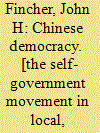

|
|
|
|
|
| Publication |
London, Croom Helm, 1981.
|
| Description |
276p.hbk
|
| Standard Number |
0709904630
|
|
|
|
|
|
|
|
|
|
|
|
Copies: C:1/I:0,R:0,Q:0
Circulation
| Accession# | Call# | Current Location | Status | Policy | Location |
| 020128 | 321.80951/FIN 020128 | Main | On Shelf | General | |
|
|
|
|
| 5 |
ID:
092373
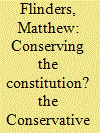

|
|
|
|
|
| Publication |
2009.
|
| Summary/Abstract |
In 2008 David Cameron declared that the Conservative party was 'ready for government' and suggested that 'the change we need is not just from Labour's old policies to our new policies… It's about a change from old politics to new politics'. This 'new politics' narrative is something of a cliché: British constitutional history reveals a regular pattern whereby opposition parties renege upon implementing far-reaching constitutional and democratic reforms once they win power. It is in this context that this article draws upon documentary analysis and a number of interviews to examine the Conservative party's position on constitutional reform and democratic renewal. It concludes that although the Conservative party has spent the last decade decrying the 'destruction' of the constitution it has undertaken little detailed preparatory work in relation to how it might seek to alter the governance of Britain. As a result the research presented in this article provides a number of insights into elite politics, strategic game-playing and executive veto capacities within a context of growing political disengagement from politics and falling levels of trust in politics.
|
|
|
|
|
|
|
|
|
|
|
|
|
|
|
|
| 6 |
ID:
149038
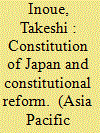

|
|
|
|
|
| Summary/Abstract |
Although there have been movements to revise the Constitution of Japan, the original text has remained in effect for 70 years. This article examines the rules of constitutional revision, the basis on which the Constitution was drafted, and the ramifications of an unmodified constitution. Japan's Constitution is compared in terms of length and number of revisions with those of other industrialized countries. The article concludes with recommendations for making Japan's Constitution better able to function in a legal capacity.
|
|
|
|
|
|
|
|
|
|
|
|
|
|
|
|
| 7 |
ID:
091111
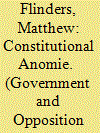

|
|
|
|
|
| Publication |
2009.
|
| Summary/Abstract |
'The Governance of Britain' agenda represents Gordon Brown's attempt to respond to long-standing criticisms regarding the way in which Labour governments have since 1997 approached the topic of constitutional reform and democratic renewal. The central argument of this article is that the Labour Party remains afflicted by constitutional anomie and these recent documents, combined with the behaviour of politicians, have done little in response. This article is of methodological importance because it assesses the cumulative impact of recent reforms through the application of Lijphart's framework and reflects on the utility of this tool. It is of conceptual importance because the results of the systematic analysis add further weight to the accusation of constitutional anomie while also allowing the development of a new conceptual tool - bi-constitutionality - which offers a way of understanding long-standing debates. The article is of normative importance because it avoids the descriptive-prescriptive approach to constitutional literature that has dominated British political studies, and it is relevant for comparative politics because it replicates and takes forward a methodology that has been applied around the world. In doing so it provides a critical case of executive politics and statecraft vis-à-vis constitutional reform.
|
|
|
|
|
|
|
|
|
|
|
|
|
|
|
|
| 8 |
ID:
116355
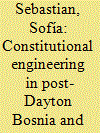

|
|
|
|
|
| Publication |
2012.
|
| Summary/Abstract |
This article reflects on the dynamics associated with state building in post-conflict Bosnia and Herzegovina (BiH) with a particular focus on the role of external agency. The debate over constitutional reform has featured prominently in BiH since the early 2000s. The objective of this reform was to transform Dayton into a functional institutional framework that prepared the country for both international withdrawal and EU integration. Based on a detailed analysis of two international initiatives launched in 2005 and 2009 this article analyses the reasons why constitutional engineering in post-Dayton BiH failed. More specifically, the article argues that this reform failed as a result of various shortcomings including international divisions; a democratic deficit inherent in the process; and the neglect of local conditions (including conflicting notions of the future form of the state by both local and external actors).
|
|
|
|
|
|
|
|
|
|
|
|
|
|
|
|
| 9 |
ID:
142275
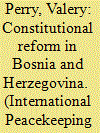

|
|
|
|
|
| Summary/Abstract |
This article considers Bosnia and Herzegovina (BiH)'s constitutional reform path options following the 20-year anniversary of the Dayton Agreement that ended the war. The need for substantive structural and constitutional reform has not gone away, and there is an open question on whether and how Euro-Atlantic integration processes might influence reform outcomes. First, a brief review of constitutional reform efforts to date is presented. Second, arguments for and against constitutional reform in BiH are summarized. Next, some characteristics of federal and confederal systems are introduced to frame discussions on BiH decision-making capabilities, and the role of the state vs lower levels of government. This includes a discussion on the issue of a BiH ‘coordination mechanism’ to manage EU integration, and whether or not the state might need some sort of supremacy clause. The article closes with some musings on the apparent trajectory of the country. The case of BiH is not sui generis, and can contribute to the literature and potentially influence policy-makers interested in the implementation and possible re-negotiation of peace treaties and constitutions – issues relevant to any countries emerging from divisive, violent conflict.
|
|
|
|
|
|
|
|
|
|
|
|
|
|
|
|
| 10 |
ID:
129643
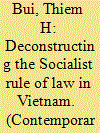

|
|
|
|
|
| Publication |
2014.
|
| Summary/Abstract |
Over the past two decades, efforts by the Communist Party of Vietnam (CPV) to build a "socialist" rule of law through legal and judicial reforms have contributed to the vibrant constitutional politics in the country. During the process of amending the 1992 Constitution, the socialist theoretical foundations of the Constitution quietly shifted as a result of new thinking and values. The complex interactions of old and new ideological precepts were prominently reflected by the changing discourse of human rights during debates about amendments to the 1992 Constitution. This article investigates the development of the "socialist" rule of law and the changes taking place in the discourse of human rights during the constitutional reform process in Vietnam. In setting out the context and content of constitutional reform, it seeks to deconstruct the socialist rule of law and interpret the discourse of human rights accordingly. In doing so, the mechanisms by which human rights have been socialized will be unpacked to make sense of subtle changes in the human rights discourse. Furthermore, the paper aims to uncover the implications of such a change for the development of Vietnam's human rights regime.
|
|
|
|
|
|
|
|
|
|
|
|
|
|
|
|
| 11 |
ID:
117498
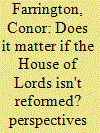

|
|
|
|
|
| Publication |
2012.
|
| Summary/Abstract |
In May 2011 the Coalition government published a draft bill for reform of the House of Lords, proposing an upper chamber composed of 80% elected and 20% appointed members serving for single 15-year terms. These plans reflect aspects of the stated positions of the main political parties, votes in the House of Commons, and broader political and scholarly debates over the past decade. Nevertheless, there is significant opposition from across the political spectrum, and there is a significant possibility that the proposed reforms will not be enacted before the next general election. This article draws on the views of participants (including three current peers) in a Symposium at Trinity Hall, Cambridge to argue that the likely failure of the reforms may be less disastrous than many suppose. Especially since the 1999 reforms, the House of Lords is in many ways a more active and legitimate chamber than is commonly realised.
|
|
|
|
|
|
|
|
|
|
|
|
|
|
|
|
| 12 |
ID:
086973
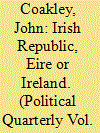

|
|
|
|
|
| Publication |
2009.
|
| Summary/Abstract |
One of the less visible consequences of the Good Friday (Belfast) Agreement of 1998 was that it finally put to rest a fifty year dispute between Ireland and the United Kingdom about the names of the respective states. This article begins by outlining the constitutional background to this complex terminological dispute, and then examines it from three perspectives. The first is that of the Irish state itself, which in recent decades has opted unambiguously for 'Ireland'. The second is the British government, which until the end of the twentieth century preferred the labels 'Eire' or 'Irish Republic'. The third is the militant nationalist republican movement, whose terminology was designed to deny the legitimacy of the existing state. The article concludes by examining the political significance of this issue, arguing that while its most obvious importance is symbolic, it has also had real meaning for the identity and for the geographical definition of the state, as well as for the British-Irish relationship.
|
|
|
|
|
|
|
|
|
|
|
|
|
|
|
|
| 13 |
ID:
138271
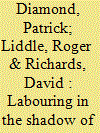

|
|
|
|
|
| Summary/Abstract |
The British state is in flux and the Labour party is struggling to shape an effective response to the politics of disunification. This article reflects on the nature of Labour's governing project and its conception of modern statecraft which has evolved since the party became a serious contender for power in the aftermath of the First World War. We argue that Labour's initially pluralising instincts cultivated in opposition have been checked by the ongoing reality of a state-centric mode of governing, in which the party continued to robustly defend the Westminster model operating within the parameters established by the British Political Tradition (BPT). Ed Miliband's conception of ‘One Nation’ Labour threatens to reinforce this historical pattern of reversion to the Westminster model, at precisely the moment when devolutionary forces are destabilising the existing political settlement. To break out of this impasse, Labour must look elsewhere in its ideological lexicon for inspiration, chiefly to the tradition of socialist pluralism and associationalism.
|
|
|
|
|
|
|
|
|
|
|
|
|
|
|
|
| 14 |
ID:
138888
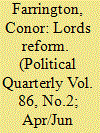

|
|
|
|
|
| Summary/Abstract |
The failure of the Coalition government's attempt to reform the House of Lords has by no means taken further reform off the political agenda. The commitment to installing an elected upper chamber is still widely shared across the political spectrum, on the basis of perceptions that the House of Lords lacks democratic legitimacy. Against this view, this article considers recent literature upon non-electoral representation, deliberative democracy and bicameralism, which together highlight the possibility of an unelected second chamber playing a legitimate role within a wider (democratic) system of government. The article then considers the House of Lords from this perspective, reflecting on changes in the upper chamber since the 1999 reforms and evaluating its role within the wider political system. The paper concludes by suggesting that political debate should focus upon small-scale reforms to ensure that the Lords becomes more effective, representative and legitimate, within the constraints of its present role.
|
|
|
|
|
|
|
|
|
|
|
|
|
|
|
|
| 15 |
ID:
156721
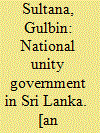

|
|
|
|
|
| Publication |
New Delhi, IDSA, 2017.
|
| Description |
48p.pbk
|
| Series |
IDSA Occasional Paper no. 47
|
| Standard Number |
9789382169772
|
|
|
|
|
|
|
|
|
|
|
|
Copies: C:2/I:0,R:0,Q:0
Circulation
| Accession# | Call# | Current Location | Status | Policy | Location |
| 059238 | 320.5493/SUL 059238 | Main | On Shelf | General | |
| 059239 | 320.5493/SUL 059239 | Main | On Shelf | General | |
|
|
|
|
| 16 |
ID:
132153
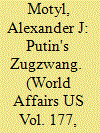

|
|
|
|
|
| Publication |
2014.
|
| Summary/Abstract |
The choice of outcome in the Russia-Ukraine standoff is largely Vladimir Putin's. Ukraine and the West are not powerless, but they can at most anticipate, prepare for, and deter what might be Putin's next move. This does not mean that they are victims of superior statecraft, however. His admirers may regard Putin as a master strategist, whose petulance and unpredictability give him the upper hand in relations with the West and Ukraine. In fact, the opposite is true. Putin has maneuvered himself, and Russia, into a position of Zugzwang-a chess term denoting a condition in which any possible move will worsen the player's position.*
|
|
|
|
|
|
|
|
|
|
|
|
|
|
|
|
| 17 |
ID:
174553
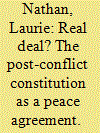

|
|
|
|
|
| Summary/Abstract |
When intra-state armed conflicts end through a negotiated settlement, the conflict parties frequently agree to amend or replace the country’s constitution. Their aim is to entrench the settlement, address the conflict incompatibility, reform institutions and take other measures to prevent a recurrence of violence. This article argues that post-conflict constitutions (PCCs) should be understood as peace agreements. It motivates this argument on conceptual, functional and legal grounds. It demonstrates that PCCs comply with conventional definitions of a peace agreement, are an intrinsic component of the conflict resolution process and have a range of peace maintenance functions. As supreme law, they become the definitive peace agreement. Research on peace durability following negotiated settlements should therefore focus not only on comprehensive peace agreements (CPAs) but also on PCCs. PCCs should be conceived not as mere components of CPA implementation but as substantive political and legal agreements in their own right and as independent causes of peace.
|
|
|
|
|
|
|
|
|
|
|
|
|
|
|
|
| 18 |
ID:
155420
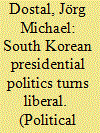

|
|
|
|
|
| Summary/Abstract |
The impeachment of President Park Gyeun-hye on 10 March 2017 saw South Korean politics enter a period of crisis. Her removal from office, the result of an unprecedented mass movement of citizen protests, provided a springboard for the subsequent success of the liberal candidate, Moon Jae-in, in the presidential election of 9 May 2017. This article suggests that political change in South Korea is only possible if actors move beyond the politics of personality, and tackle the structural reasons for the policy failures of recent times. Further, if democracy, a humane economic system and responsive political institutions are going to be developed and nourished, the country's ‘imperial presidency’ needs to be reformed. In particular, the current ‘winner-takes-all’ politics, with the presidency as the main locus of power, needs to be reformed in ways that promote a more balanced political system, increasing the influence of other actors and institutions.
|
|
|
|
|
|
|
|
|
|
|
|
|
|
|
|
| 19 |
ID:
157818
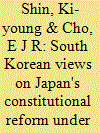

|
|
|
|
|
| Summary/Abstract |
In this Special Section, this article reviews South Korean views on Japan's ‘peace’ Constitution and the Abe government's attempts at constitutional reform. It identifies three different understandings among South Korean academics on why Japan is escalating attempts to revise the Constitution under the Abe government. An in-depth analysis demonstrates that all three perspectives pay specific attention to Japan's constitutional reform in relation to security policy changes. However, they differ in assessing the impact of Japan's constitutional reform on South Korea as well as how South Korea should deal with such a change. A minority opinion considers Japan's ‘remilitarisation’ through constitutional revision as conducive to South Korean security interests by increasing deterrence against North Korea, whereas the dominant opinion is that any attempt to revise the Constitution could be in and of itself a potential threat to South Korea's security due to a lack of trust attributed to unresolved historical conflicts between Korea and Japan. However, all three approaches pay hardly any attention to the positive role of Japan's peace Constitution while Japan's peace Constitution might provide a regional peace model in Northeast Asia.
|
|
|
|
|
|
|
|
|
|
|
|
|
|
|
|
| 20 |
ID:
044679


|
|
|
|
|
| Publication |
London, C.Hurst & Company Ltd., 1977.
|
| Description |
xvi, 496p.hbk
|
| Standard Number |
0903983451
|
|
|
|
|
|
|
|
|
|
|
|
Copies: C:1/I:0,R:0,Q:0
Circulation
| Accession# | Call# | Current Location | Status | Policy | Location |
| 017275 | 954.93080/DES 017275 | Main | On Shelf | General | |
|
|
|
|
|
|
|
|
|